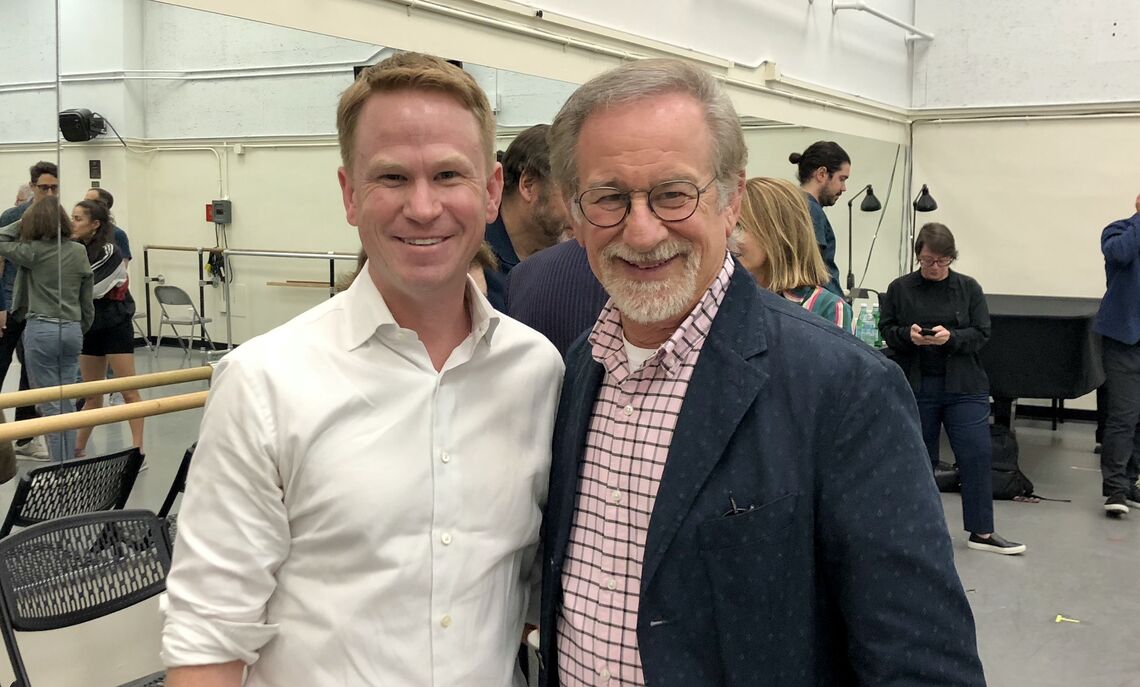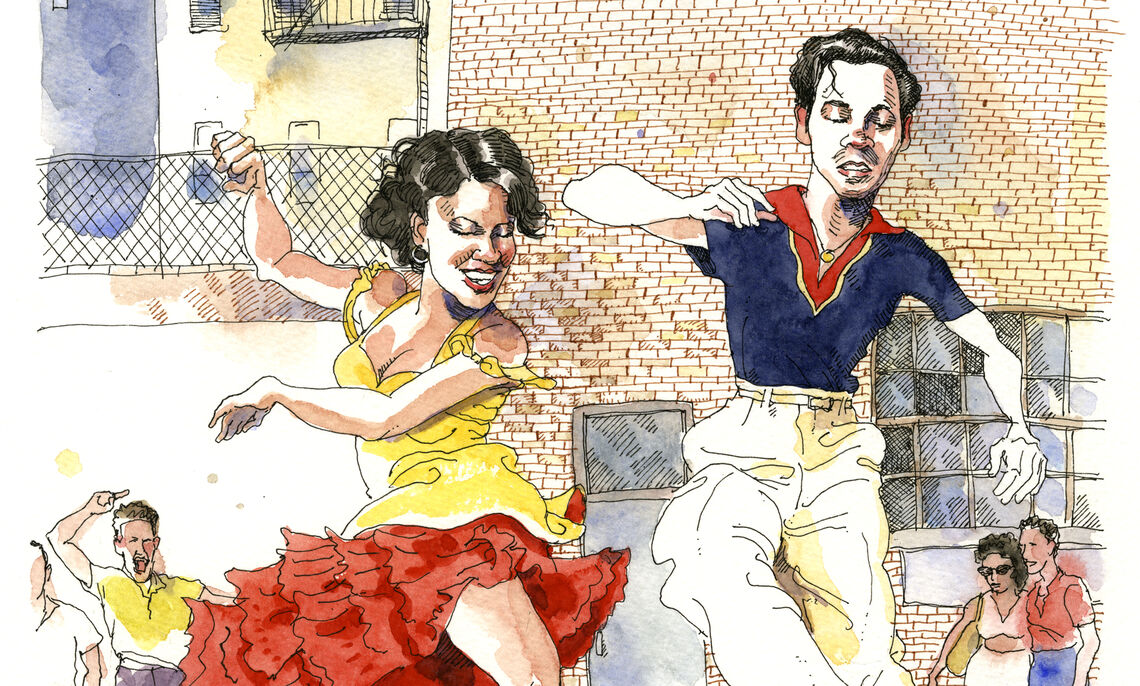F&M Stories
Alumnus Works With Spielberg to Bring 'West Side Story' to Big Screen
The journey from Scranton to New York City takes approximately two hours by car. But for a 13-year-old boy in 1990, it was a trip into the future.
With thick red hair and passion for stage and screen, a young Jonathan Lomma '99 made several trips to the Big Apple during the audition process for a role in Steven Spielberg's film "Hook." He earned a spot as a finalist for the part of the younger version of Robin Williams' character, Peter Pan. One afternoon, he performed screen tests for Spielberg — who was impressed with the talented teenager from Pennsylvania's coal country. Though Lomma didn't get the part, the world's most commercially successful filmmaker had some parting words to remember:
"I have a feeling I'll see you again."
Twenty-five years later, it happened. Lomma, by then a theatrical literary agent for William Morris Endeavor in New York, found himself across the table from the famous director. They were discussing the rights to "West Side Story," which Spielberg was attempting to launch as a feature film with 20th Century Studios. Lomma represented the estates of Arthur Laurents, who wrote the script for the story in 1961, and Jerome Robbins, who came up with the concept for "West Side Story."
"I reminded Steven that we had met during the auditions for 'Hook,' and also of his parting words to me," Lomma says in his office on Madison Avenue. "Toward the end of shooting for 'West Side Story,' I gave him a green baseball cap that had a red graphic of a feather on the side, so from the right angle it's Peter Pan's hat. He wore it the whole day and kept explaining the reference to people."
Spielberg's version of the classic musical opened in December to positive reviews from both critics and moviegoers. It was nominated for seven Academy Awards, including Best Picture and Best Director. What's it like to play a central role in all that success? Lomma doesn't see it that way.
"I didn't have a central role, and that's very important for any agent to understand," he says. "It is a peripheral role. Arthur Laurents, Jerry Robbins, they are the center. Steven is the center... My role was one of advocacy. Agents help enable the real work."
Finding Home
In the late 1990s, the Green Room Theatre at Franklin & Marshall became Lomma's home away from Scranton. He had trouble carving out his niche in high school and didn't always fit in. That changed in the College's beloved theatre along College Avenue, where Lomma performed in seven productions as a student.
"The Department of Theatre, Dance and Film at F&M was like a drink of fresh water after years in the desert," says Lomma, who majored in English and theatre. "Professors Dorothy Louise, Virginia West and John Whiting said 'Here's a place for you.' The only time I left the Green Room Theater or Other Room Theater [a smaller, more intimate theatre on Pine Street] was to sleep. I used to bring my lunch from the Common Ground to the costume shop and just sit there watching Ginny build the costumes. Leaving F&M was rough, because I knew I'd never ever have an experience that equaled it. And so far, I've been right."
West wouldn't blame others if they believed Lomma lived in the costume shop. "Jonathan was meticulous when preparing a character, and we had lots of conversations about costumes, makeup and movement," she says. "His final role at F&M was Tartuffe, and he created a desiccated, peeling makeup that was really quite stunning, and the perfect finish to the withered, corrupt character he brought to the stage."
Then it was on to law school at American University, where Lomma met his wife, Shea. He didn't know where his career would lead him, but he did know a law degree could open many doors. One day, Shea suggested he look at the William Morris Agency. It was a real epiphany, he says.
"Like a Saul on the road to Damascus kind of epiphany," he remembers. "Like, 'Wow why didn't I ever think of this?' It combined everything I had ever spent time on. I wasn't good enough to be a professional actor. Not too many call sheets say we need a 5-foot-8 guy with flat feet and orange hair who can't sing or dance. Admitting that to myself was the beginning of the investigation into what am I the best at. That turned out to be an advocate for artists, specifically writers and directors of plays and musicals. I had just finished three years of law school learning all about contracts, intellectual property and counseling clients. Of course, being an agent would use all of that— it just never occurred to me."
Gutta Cavat Lapidem
Fellow F&M alum Dana Amendola '82, vice president of operations at Disney Theatrical Group, wrote Lomma a reference, helping him land the job in New York. He started as an assistant at William Morris, knowing he had to learn the profession by listening, being patient and soaking up as much as he could from those around him. A quote from the Roman poet Ovid— "Gutta Cavat Lapidem"— reminded Lomma each day about the value of patience when he saw it on the wall of the Bryant Park subway station in New York.
"It means, 'Dripping water hollows out a stone,'" Lomma says. "Patience is a form of action. That's what I had to learn."
In 2009, he became a full-fledged theatrical literary agent. His first client was Robbins, who choreographed the original "West Side Story" production in 1961. The list grew to include other big names, including author Paula Vogel, book writer Terrence McNally, and director Edward Albee.
"I was trying to sign Edward Albee, so I scheduled lunch for both of us at Nobu because I knew he was a regular there," Lomma says. "But I didn't know the first thing about sushi. I could talk to this man about all his plays, and what they meant to our culture, but I didn't know what the hell a California roll was. So, my wife took me to sushi restaurants every night before the big meeting so I could learn how not to look like an idiot."
West Side Story
An equally big meeting came in 2015, when he had that first meeting with Spielberg and others in Tribeca to discuss "West Side Story." Over the course of seven years, Lomma estimates he had between 15 and 20 meetings with Spielberg, his right-hand associate, Kristie Macosko-Krieger, and representatives of 20th Century Fox.
"The studio was surprised by the level of involvement and collaboration the estates [of Laurents and Robbins] expected, and those conversations had to be firm while remaining warm and sending the message we were eager for this to happen," Lomma says. "Steven seemed less surprised and showed up to our first meeting with a pad, a pencil and a real approach to making the movie. That first meeting felt like a work session."
Spielberg wanted to have a level of freedom with Robbins' choreography, telling Lomma, "I need some room to explore it, to make it fit the script Tony is working on." The Robbins estate had to weigh that decision carefully, according to Lomma. "We had been looking at the choreography the way, say, Steven Sondheim was looking at the lyrics: not something to change. And here was Steven Spielberg saying it could not be a strait jacket."
Each step of planning and production had its own conversations and developments, Lomma says. They spent almost a year negotiating with Fox before it was acquired by Disney and renamed 20th Century Studios. There were pre-production issues. Casting issues. Script issues. But it was all memorable for the boy from Scranton.
"During production, Steven gave me a chair on the set which he sent to me after they were done filming," Lomma says. "And at the premiere last year, he thanked me by name from the stage and asked me to stand. That's something you don't get over. At least I haven't."
Related Articles
March 4, 2026
A Peek Behind the Stacks: A Student’s Role in the College Library
Learning by doing is a hallmark of the Diplomat experience. For Abby Jones ’28, this philosophy comes to life at the College Library in a role that blends her love of reading, writing, and stories. “I’ve always loved libraries, and was excited to step into a job where I’d get to work with a lot of the books in a more hands-on way,” she said.
March 2, 2026
[Video] Thinkers, Doers, Diplomats: Maj. Gen. Richard P. Mills ’72 on the Spirit of Service
For Maj. Gen. Richard P. Mills ’72, an F&M education was the launchpad for a storied military career and a lifelong journey of discovery. As he watches today’s Diplomats walking the same paths he once did, Mills sees a familiar pilgrimage toward a future of influential leadership and engaged citizenship.
February 24, 2026
Brett Harwood ’71 Makes $1 Million Gift to Support Jewish Life, Student Experience
A transformational gift of $1 million from Brett Harwood ’71 will support F&M’s vibrant Jewish life programming, foster campus dialogue, fund a faculty position and boost the College’s student retention efforts.


